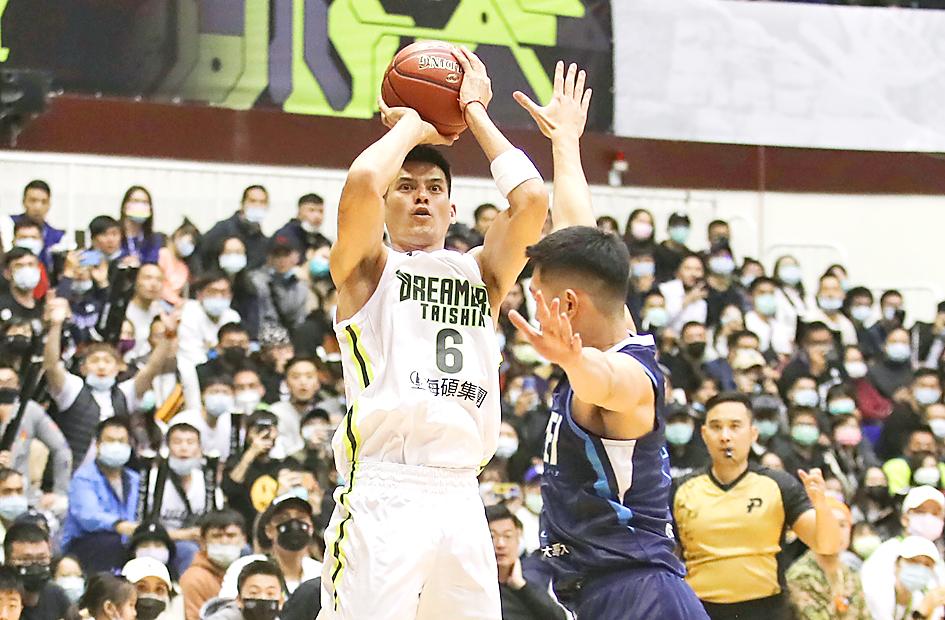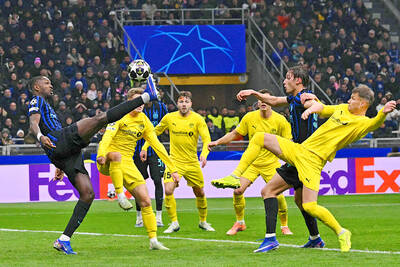When more than 6,000 spectators packed into Changhua County Stadium on Dec. 19 last year, they were there to witness a historic moment — the first professional basketball game in Taiwan since the shutdown of the Chinese Basketball Alliance (CBA) more than 20 years previously.
The game in Changhua was the official opener of Taiwan’s new four-team professional basketball league — the P.League+ — and it was won 89-86 by the visiting Taipei Fubon Braves over the Formosa Taishin Dreamers.
However, the final score was less important to the fans in attendance than the overall experience, featuring team mascots, pregame and halftime shows, and the chance to wear or hold team merchandise they could buy at the courtside fan shop.

Photo: CNA
The younger fans in attendance would not have remembered the last time a professional basketball game was held in Taiwan or that there even was a professional league from 1994 to 1999.
The CBA was the second professional basketball league set up in Asia after the Philippine Basketball Association and was very popular for a few years, often drawing sellout crowds.
However, in its fifth season in 1999, the league suspended operations due to a broadcasting rights dispute and the financial difficulties that beset companies sponsoring some of the six teams due to the 1997 financial crisis.
Since then, Taiwan has been without professional basketball. Filling the void has been the Super Basketball League (SBL), a semi-professional men’s basketball league founded in 2003 and run by the Chinese Taipei Basketball Association (CTBA).
The SBL enjoyed considerable popularity in its early years, but several factors conspired to erode that support. Among them are the lackluster advertising and marketing strategies used by the CTBA, which lacks the experience to build a truly professional operation, and the flight of many of Taiwan’s top players to China’s professional league, where salaries are double or triple those in Taiwan.
Those problems drove down attendances, leading some sponsors to pull out, and a league that once had seven teams now only has five.
That was why P.League+ founder and chief executive Blackie Chen, a TV personality and former CBA player, said that he felt Taiwan needed a real basketball league when he announced the P.League+’s formation in May last year.
“What we really need now is a professional basketball league. Even though many may think the SBL is Taiwan’s main league, it is not really a professional league,” Chen said.
A major difference with the SBL, where teams have corporate identities, is that the P.League+ focuses on the cities and arenas identified with a particular franchise, Chen said.
The Fubon Braves play in Taipei, the Dreamers play in Changhua County and the Taoyuan Pilots and Hsinchu JKO Lioneers are based in Taoyuan and Hsinchu, as their names suggest.
The teams have worked closely with their local governments to promote the new league, hoping to build a strong bond with local fans.
The SBL has tried for years to build this “home court” concept used by professional basketball leagues around the world, without success, but it has worked well so far for the P.League+, helped by the league’s professional marketing under 43-year-old Chen.
In the first 15 league games where fans were allowed to attend, seven have sold out and the attendance has averaged 6,068, higher than the 2019 average attendance of 5,800 fans for professional baseball, Taiwan’s No. 1 sport.
In contrast, the SBL opener for its 18th season drew only 1,500 fans and a game on Dec. 10 last year drew an embarrassingly low turnout of only 100.
Jerry Lin, a veteran public address announcer who has worked thousands of CBA and SBL games, said that he has high hopes for the new league, and praised its marketing team for creating a sense of anticipation around the league and its games.
Commentator Lee Yi-sheng agreed.
“The opening of the new league has created a buzz in basketball circles not seen for years,” and has given young Taiwanese players something to look up to, Lee said. “If the new league can offer more competitive salaries, I believe many top-level Taiwanese players will stay in Taiwan instead of playing across the [Taiwan] Strait.”
However, challenges still exist, as the CBA and SBL discovered after early optimism when they were founded.
The biggest is how the P.League+ can continue to live up to fans’ expectations and maintain their loyalty once the sense of novelty and excitement around the new league fades, pundits said.
Sports commentator Marc Tien, who worked on SBL games in its first 10 seasons, applauded the new league for “taking a brave first step” that could revive professional basketball in Taiwan.
However, what is important now is how each franchise continues to build a loyal home following and “listens to the voices of fans,” Tien said.
Also, with only four teams in the league, maintaining a competitive balance and preventing the emergence of one or two super teams that win all the time would be key, he said.
Taipei Fubon Braves coach Hsu Chin-che, who coached in the SBL for years, said that the league’s long-term viability would depend on fostering a willingness among fans to spend money to regularly attend games.
At the same time, the arrival of the P.League+ does not mean certain doom for the struggling SBL.
As a semi-professional league funded by the CTBA, the SBL is likely to continue operating for years to come, even if it cannot compete with the P.League+ at the box office, Lee said.
One of its advantages is the opportunity it gives to younger Taiwanese to play and grow their games, he said, much needed because the P.League+ allows two foreign imports to be on the court at the same time, limiting the chances for younger Taiwanese players to develop.
Whatever the future holds for the P.League+ and the SBL, there is no denying that the new professional basketball league has injected some much-needed vitality in Taiwan’s long-stagnant basketball scene.
Former Taiwan national team head coach Yen Chia-hua, now a consultant to five-time SBL champions Taiwan Beer, understands the potential pitfalls, but remains hopeful.
“After a long wait of 21 years, we finally have a new professional league. I hope the new league will create a new environment for basketball in Taiwan,” Yen said.

Fenerbahce on Thursday earned a rare 2-1 win in England, but were still knocked out of the UEFA Europa League by Nottingham Forest in the playoffs. Forest entered the second leg with a healthy 3-0 lead from the opener in Istanbul — where Vitor Pereira made an impact in his first game in charge — and that proved enough to advance to the round-of-16 with a 4-2 aggregate score. The result was a boost for Forest, struggling at 17th place in the Premier League, in their return to Europe after three decades. They next face Real Betis Balompie or Kerem Akturkoglu gave Fenerbahce

The Cleveland Cavaliers on Tuesday emphatically got back to winning ways in the NBA, coasting to a 109-94 victory over the New York Knicks as their recent star signing, James Harden, scored 20 points. The Cavs took the lead barely a minute into the game with an Evan Mobley three-pointer and never gave it up in a thoroughly comfortable night for the red-hot Ohio franchise. Former NBA Most Valuable Player (MVP) Harden, who was brought in from the Los Angeles Clippers this month, has never won a championship, despite being one of the most decorated players in the league. That was a key

Soccer officials yesterday offered “full support and assistance” to the Iranian team in Australia for the AFC Women’s Asian Cup after the US and Israel launched massive attacks on their homeland. Iran’s 26-strong squad arrived on the Gold Coast days before the strikes on Saturday killed supreme leader Ayatollah Ali Khamenei, as Washington and Tel Aviv seek to topple the Islamic republic. They are due to open their tournament today against South Korea. The AFC in a statement said it “continues to closely monitor the recent developments in the Middle East during this challenging period.” “The AFC’s foremost priority remains the welfare, safety and

HAT-TRICK: In the other games, Newcastle United and Leverkusen also advanced, as did Atletico Madrid, with Alexander Sorloth scoring three goals What a difference a year makes. Or nine months to be precise. Last season, Inter reached the UEFA Champions League final in style, with thrilling victories over Bayern Munich and Barcelona, but on Tuesday, the Italian giants limped out of the competition with a disappointing 2-1 loss at home to Bodo/Glimt — knocked out in the playoff round 5-2 on aggregate — in what is being labeled as one of the biggest upsets in Champions League history. It was not the first major upset the tiny Norwegian team have pulled off this season after wins over Manchester City and Atletico Madrid, and